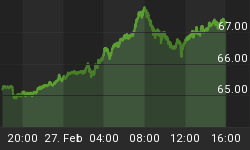This week the Federal Reserve took a step closer to acknowledging reality. Unfortunately it didn't let that admission move it from a policy course firmly guided by fantasy. In its policy statement, Bernanke & Co. took the important step in noting that inflation expectations had taken hold in the country at large. However, in asserting that it expects inflation to moderate this year and next, the Fed gave no indications that these heightened expectations are gaining traction within the Open market Committee itself. As a result, it signaled no likelihood that it was actually prepared to do something to fight a problem which it doesn't really believe exists in the first place.
In fact, by indicating that they expect inflation to moderate, the Fed is saying that elevated expectations are unwarranted. In other words, Bernanke claims that despite the fact that so many people are carry umbrellas, he still believes it will be a sunny day. The takeaway from the statement is that no rate hike is forthcoming. The markets saw this position for what it is....capitulation to inflation and a weakening dollar. No surprise then that the gold responded with the biggest single day gain in more than 20 years!
With the ensuing carnage on Wall Street, many Thursday morning quarterbacks claimed the Fed missed an opportunity to reverse the dollar's slide by either talking tougher or perhaps actually raising rates a quarter point. If the Fed really believed it could talk the dollar up, or that a small rate hike would do the trick, they would have given it a try. I believe they chose a dovish route because of a greater fear of having their hawkish stance casually disregarded. Imagine what would happen if the Fed raised rates and the dollar kept falling? It would be like one of those horror movies where someone holds a cross up to a vampire, and the Count tosses it aside with nary a cringe.
Others claim that now is the time for coordinated central bank intervention to reverse the dollar's decline. Those who place their faith in such a plan, overlook the fact that Asian and Middle East central banks have been unsuccessfully intervening on the dollar's behalf for years. Those nations maintaining dollar pegs must constantly intervene in the foreign exchange markets by buying dollars to keep their own currencies from rising in value. Over the past few years the scope of this intervention has been unprecedented, with foreign central banks accumulating trillions of excess dollar reserves. Yet despite these Herculean and misguided efforts, the dollar has fallen drastically.
Intervention advocates must believe that if the ECB and a few other central banks joined the fray, that a better outcome would be achieved. However any additional efforts to artificially prop up the ailing dollar will be equally ineffective. Even if ECB intervention could slow the dollar's decent, what possible reason would they have for doing so? The ECB is already concerned about inflation and is preparing to raise rates as a result. Intervention to support the dollar will only worsen Europe's inflation problem and run counter to these efforts. This is because to buy dollars the ECB must increase its own money supply. That is exactly what is happening in countries like China and Saudi Arabia, which is why inflation in those nations is already much higher than it is in Europe.
Further, since the ECB is asking Europeans to endure higher interest rates to fight their inflation battle, why should they have to make additional sacrifices to help Americans fight their own inflation? Especially when our own central bank has held interest rates at the ridiculously low level of 2%, and has effectively excused Americans from the conflict.
Since we can't count on any help from our friends, the only option would be for the Treasury to intervene unilaterally. However, the U.S. government should think twice about bringing a knife to a gunfight. The Treasury only has about $75 billion in foreign currency reserves with which to intervene. The war chest is just a spit in the ocean. To put this number in perspective, Poland has $77 billion, Turkey has $78 billion, and Libya has $79 billion. On the other end of the spectrum, China has $1.7 trillion (not counting Honk Kong's 150 billion) Japan has $1 trillion, Russia has $550 billion, India and Taiwan each have about $300 billion. Singapore, a nation with fewer than 5 million people, has $175 billion. In fact, the United States holds just about 1% of the world's $7.6 trillion of foreign currency reserves, and our total position amounts to just 2.5% of the total daily volume of foreign exchange trading. Talk about Bambi vs. Godzilla! In other words, if the dollar is going to fall, the Treasury is completely powerless to do anything to stop it.
For a more in depth analysis of our financial problems and the inherent dangers they pose for the U.S. economy and U.S. dollar denominated investments, read Peter Schiff's book "Crash Proof: How to Profit from the Coming Economic Collapse." Click here to order a copy today.
More importantly, don't wait for reality to set in. Protect your wealth and preserve your purchasing power before it's too late. Discover the best way to buy gold at www.goldyoucanfold.com, download our free research report on the powerful case for investing in foreign equities available at www.researchreportone.com, and subscribe to our free, on-line investment newsletter at http://www.europac.net/newsletter/newsletter.asp.















